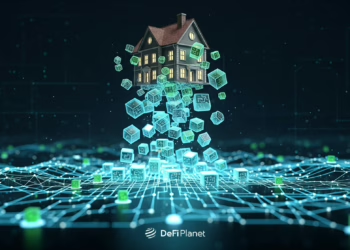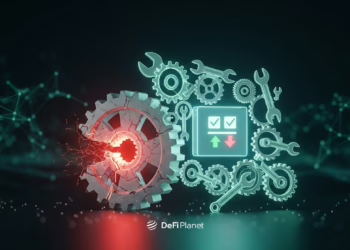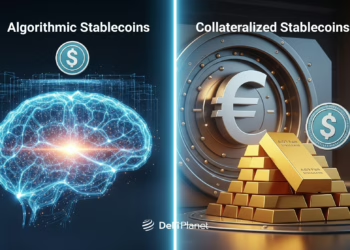Last updated on July 11th, 2023 at 10:38 pm
TLDR: Decentralized Finance (DeFi) is a growing industry that promises to disrupt Traditional Finance (TradFi). DeFi is a set of decentralized, permissionless protocols that provide financial services without a middleman or central authority to facilitate operations. There is a need for an open, transparent, and secure financial system and DeFi is emerging as an alternative that can help build such a system.
Introduction
In 2011, Marc Andreessen [1] discussed how software was eating the world. He further elucidated on how internet-native companies like Amazon, Twitter, Spotify are revolutionizing industries.
Amazon replaced consumer sales, Spotify changed the way people consumed music, LinkedIn made the recruitment process easier. All these companies replaced businesses that did not embrace internet technology.
Why were these companies successful?
Because they were faster, cheaper, and offered real benefits to the users.
To Andreessen, it was evident that in no time, these software native companies would eat every industry.
While this prediction has become true for most industries, the same cannot be said about Finance. The current financial system is still based on the age-old infrastructure and hasn’t truly embraced software and automation completely.
You may ask, what about FinTech then?
FinTech has only been able to give a nice UX facelift to the existing system which is ingrained with obstacles and long-drawn processes at each step.
This brings us to DeFi which enables software-like changes for financial service that It has the potential to make finance faster, cheaper, and better.
Let’s dive in.
What Is DeFi?
DeFi is a system that uses blockchain technology and smart contracts to make financial products available to be used by anyone, anywhere in the world without having to go through a middleman.
When Bitcoin was introduced as an alternative to fiat currencies, the Bitcoin community was hopeful of a world with functional sound money. But what excited the community the most was the introduction of a technology that enabled Bitcoin. A technology that could remove the middlemen and create trust blockchain.
While Bitcoin solved the problem of trust in money, blockchain offered the technology that had the potential to solve the problem of trust in general through the application of smart contracts.
When developers in the space explored the usability of blockchain, smart contracts attracted their attention.
What is a smart contract?
A smart contract is a self-executing contract with the terms of the agreement written into lines of code. It is a tamper-proof, guaranteed code that executes as the user intended it to. The code and the agreements exist across a decentralized blockchain network. Smart contracts enable money and payments to become “programmable”.
What is programmable money?
When issued as a token on a blockchain, money becomes programmable as it has inherent logic. This logic gives the programmer the ability to impose properties on the token e.g. to ensure that the token may only be spent on certain goods or to execute interest payments [2].
What are programmable payments?
Tokens can be programmed to follow a predetermined logic and automatically execute once certain conditions are met. Examples already exist in TradFi; standing orders and direct debits. However, blockchain allows for more complex conditions to be set e.g. to make payments to multiple recipients in differing amounts depending on circumstances [3].
What’s exciting about smart contracts and programmability?
The fact that the code can run perpetually and control the execution provides greater reliability. Moreover, the transactions executed through a smart contract are trackable and irreversible. This is where the trust issues are addressed as with smart contracts, transactions can take place without the need of a central authority to facilitate the execution. They are also programmable that brings much greater flexibility in the use of money. This is particularly important in an increasingly digital world with more complex use cases.
With the development of smart contracts, the blockchain community’s focus shifted towards creating financial applications. After all, what is the benefit of having sound money like Bitcoin and other similar currency tokens if you cannot do anything with it?
This brings us to DeFi which, due to its accessibility, efficiency, and ease of transfer of value is believed to be capable of revolutionizing TradFi.
DeFi Vs TradFi: Understanding The Difference
With the emergence of DeFi as a potential solution to resolving many obstacles of traditional finance, the discussion over DeFi vs TradFi has gained momentum in recent times.
They differ primarily in terms of 2 points:
- The Trust Factor
- Financial Inclusion
The Trust Factor
DeFi’s success comes down to the fact that it solves the problem of trust. In DeFi, a public blockchain acts as the trust source which takes care of all the operations in the financial sector. Moreover, DeFi uses smart contracts which ensures that no matter what the circumstances may be, the rules, as agreed by the parties, will always be followed.
In contrast, when you use traditional finance services, you have to trust that the central authority involved, such as a bank or an insurer, will carry out your instructions and act in your best interest.
However, since society as a whole cannot trust banks to always act in this manner, you have to trust that the government will enforce laws that keep your financial resources safe. Therefore, a few central authorities (such as banks, central banks, financial regulators) control the system, and users are at the mercy of their discretion.
Financial Inclusion
DeFi is more open and transparent in comparison to traditional finance. To take part in DeFi, all you need is access to the internet, which will enable you to participate in DeFi protocols that have been built on top of public blockchains.
The lack of barriers to entry enables DeFi to solve the problem of financial inclusion in the world. It allows anyone, from anywhere to gain access to financial services.
In contrast, to participate in traditional finance, one must obtain “permission” from the gatekeepers such as banks and insurance companies.
These central authorities have excluded billions of people from the financial system. A statistics report estimates that 31% of the world’s population is unbanked, and fewer still have access to safe forms of credit or saving avenues [4].
Financial exclusion is a major societal and public policy problem which can adversely affect individuals’ life chances due to being deprived of useful and affordable financial products and services, such as the need for money transfers, transactions, savings, credit, and insurance.
Those excluded are either wholly unable to access financial services or are only able to do so in an overly costly manner. As a result, it has restricted access to traditional financial services to a limited segment of society.
How DeFi Is Eating TradFi
The traditional financial system is built on legacy infrastructure. It is plagued with age-old processes and systems that make the system inefficient.
With the application of blockchain technology and smart contracts, DeFi has the potential to turn this archaic, legacy infrastructure into an operating system that is programmable and composable.
As we move towards greater digitization and automation, the functions of traditional finance can be made more efficient with the help of DeFi.
Let’s take a look at how.
Central Banks
Central Banking as a concept is exclusive to the world of traditional finance. DeFi doesn’t need it. In DeFi, the functions of a central bank (for instance, managing money supply) are self-enforced by code.
Moreover, in some DeFi protocols where there is a need for external governance, the presence of Decentralized Autonomous Organizations (DAOs) takes care of monetary policy functions.
Furthermore, money that is traditionally issued by the central bank can be issued by a company, a DAO, or any individual. The money issued in DeFi is either governed in a decentralized manner by the stakeholders whose interests are aligned with the said money, or with the help of a self-executing code.
TradFi – Federal Reserve for the Dollar, Bank of England for the Pounds Sterling
DeFi – MakerDAO for DAI, Meta for mStable
Commercial Banks
Borrowing and lending are an important part of an efficient financial system. It is the primary business model of commercial banks. By accepting deposits and giving out loans to their clients, banks give an incentive to provide liquidity to the markets and in exchange, earn a return on their assets.
DeFi protocols enable lending and borrowing between unknown parties, that too, without the involvement of an intermediary like a commercial bank. Interest rates are set by supply and demand dynamics. The terms of the agreement are set out in the smart contract which gets executed on its own when the conditions are met.
TradFi – Wells Fargo, Bank of America
DeFi – Compound, Aave
Investment Banks
Investment banks’ primary business model revolves around providing advisory services on financial transactions. They also facilitate the creation and trading of complex financial products along with the management of assets.
DeFi protocols offer similar services to their users. For example, Synthetix is a derivatives issuance protocol that enables users to trade in derivatives of various assets. Also, Yearn Finance offers tremendous yields to its users and invests on their behalf.
TradFi – JP Morgan, Goldman Sachs
DeFi – Synthetix, Yearn Finance
Exchanges
An exchange facilitates the trading of different assets such as stocks and foreign currencies. The world of Centralized Finance (CeFi) [5] which enables the exchange of crypto against fiat money is also centralized like traditional finance.
DeFi offers decentralized trading protocols called Decentralized Exchanges (DEXes). These protocols are composed of smart contracts and function according to their defined pricing mechanisms. Such protocols play an integral role in building an independent decentralized ecosystem.
TradFi – NYSE, NASDAQ
CeFi – Binance, Coinbase
DeFi – Uniswap, Sushiswap
Insurance Companies
Insurance companies bring security for the market participants. Such companies or protocols offer similar services in both TradFi and DeFi. The difference is in the asset or the event that the cover is provided on.
For example, in the world of DeFi, insurance is provided to cover bugs in smart contracts. But there is no reason why this concept cannot be extended to cover for risk of future loss just as in TradFi.
TradFi – AXA, Geico
DeFi – Nexus Mutual, yInsure
In Conclusion…
- While it’s still quite early to talk about DeFi eclipsing TradFi, the signs are extremely positive. It is not unrealistic to state that DeFi will be more efficient and convenient to use than TradFi.
- To become more popular, DeFi needs to answer the question of what happens if some form of redress is necessary that is not covered by the smart contract. On a more practical level, DeFi protocols need to ensure that consumer interfaces are easy and intuitive to use, as this will encourage adoption
- In its short existence, DeFi has produced financial applications that have already managed to attract billions of dollars in capital. It’s well on its way to create a financial system that operates without intermediaries at a large scale.
- DeFi ditches the foundations laid out by traditional finance and builds on entirely new ones. These foundations will help create a financial system that is open, permissionless, and accessible to anyone and everyone in the world. A financial system that we can all fit into.
If you enjoyed reading this, follow DeFi Planet on Twitter and LinkedIn.
References:
- Marc Andreessen is co-founder & general partner of Silicon Valley venture capital firm, Andreessen Horowitz. He shot to fame in the 1990s as the co-founder of Netscape, the first widely used web browser.
- Bechtel, Gross, Sandner, von Wachter, “Programmable Money and Programmable Payments”, Medium, 29 September 2020.
- ibid
- Caplan, Birkenmaier and Bae, “Financial exclusion in OECD countries: A scoping review”, International Journal of Social Welfare, 2021: 30: 58–71
- CeFi refers to instances where a central authority such as a company is trusted with managing a protocol and executing transactions e.g. centralized crypto exchanges like Binance and Coinbase.





















